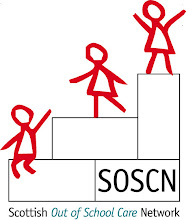Within Denmark out of school care services are referred to as “fritidshjem” (free time home) and staffed by pedagogues (degree-level qualified staff in Pedagogy [social education]). The Danish government has a duty to provide high-quality childcare; hence a high level of financial support and other resources.
For a number of years, SOSCN has organised placements for Danish Pedagogy students, some of whom have worked within Hyndland. If you would like to register your interest in having a Danish pedagogue student, please contact SOSCN.
Reflection on Danish Out of School Care Services
Beverley Anderson
Fiona Ansdell
In Denmark day-care facilities must be available to all children, and the government has assumed the cost of subsidizing a high-quality, comprehensive child-care system for infants and children from 6 months to 7 years of age, as well as an extensive after-school child-care system for school-age children.
Children requiring after school care (which can be around 90% in some areas) will go to a public after-school centre for 6-9 year-old children or a school based recreation scheme for the same age group. The local authorities must also provide the necessary club and other socio-educational leisure time facilities for children and young people from the age of 10. The local authorities are required to draw up aims and frameworks for club activities, in order to provide a variety of good stimulating leisure-time facilities. Children participate in, amongst other things, woodworking, building fires, baking bread and pizzas over open fires and looking after animals.

All facilities have a manager and deputy-manager, both of whom must be qualified pedagogues. The establishments we visited also had unqualified assistants. The staff do not have to worry about cleaning or cooking or providing snacks: chefs and cleaners are employed, and in most after school clubs parents provide food.
We found, when visiting the various after school clubs in Denmark, that the take up was considerable as schools finish at lunch time and parents typically work until four or 5pm. Furthermore, women make up nearly half the total workforce – the participation rate for women of working age is 87.5%.
Our first impression was one of amazement. The premises, outdoor areas and equipment were all far superior to what we are used to. The acceptance of after school provision being part of the education system, and the after school workers being part of the education team was very evident as was the importance of the social education provided.
At the first after school club we visited the manager shared an office with the deputy head of school. Pedagogues and teachers had joint weekly meetings and shared individual daily ‘hand-over’ meetings. We found this to be the norm.
Services are statutory and largely government funded. They are under the jurisdiction of the Ministry of Social Affairs which puts an equal responsibility on educational, social and care purposes. Parents pay approximately 30% of the costs directly to the government thus leaving the services free from the burden of fee collection. Their operational budget (from the government) was more than adequate and all the services we visited had a good range of quality equipment, resources and furnishings. All the establishments we visited were either purpose built or part of a school designed for children, with large, low windows, lots of natural light and large natural outdoor spaces. The interiors were designed to be homely with traditional Scandinavian furnishings unlike most of our schools with institutional furniture devoid of any soft furnishings. The after school cares (fritidshjem) certainly lived up to their name.

The high level of government funding results in play areas resembling adventure playgrounds with a vast array of go-karts, bikes, rope swings, climbing frames, pizza ovens, fire pits and tools for indoors and out use. We noted there was little discord between the children as they had an abundance of space and equipment, and little intervention was required by staff. Although many of the areas were un-fenced there seemed to be an ethos of trust which the pedagogues told us was established from a very early age. We witnessed this ourselves: the children could be out of sight in the playgrounds, in rooms on their own and still have access to knives, fires and tools. They climbed trees and raced in go-karts with limited supervision.

Comparisons between Glasgow and Holstebro are difficult as most of the establishments we visited were in fairly rural settings. One particular service, The Garden, caters for 3 – 10 year olds and is located in the countryside close to Holstebro with a garden, orchard, small farm, aviary and private forest cabin. Similarly to many Scottish out of school care services, it is run by a voluntary management committee. The parents’ input, which included physical help and donations of money, enabled the building of play houses, sheds, cart tracks and outdoor classrooms.
Visiting the Garden allowed us to examine the differences between local authority and independently run institutions. The children learned about all aspects of raising animals both for food and as pets. Animals were killed and cooked on the farm and eaten by the children, as were the eggs and fruits harvested from the orchard.
We wondered how many of our children would stay indoors playing computer games if the school playground had an all-equipped go-kart track, flying fox or BMX track?
In conclusion, we feel very fortunate in having been able to undertake our practice placement in Denmark. It was a rich and unforgettable experience which, although frustrating in that out of school care in Scotland does not receive the status and respect it has in Denmark, it nevertheless has left us feeling proud of what we have achieved in our settings and will inspire us to continue to raise our standards and continue to explore pedagogical practices.


